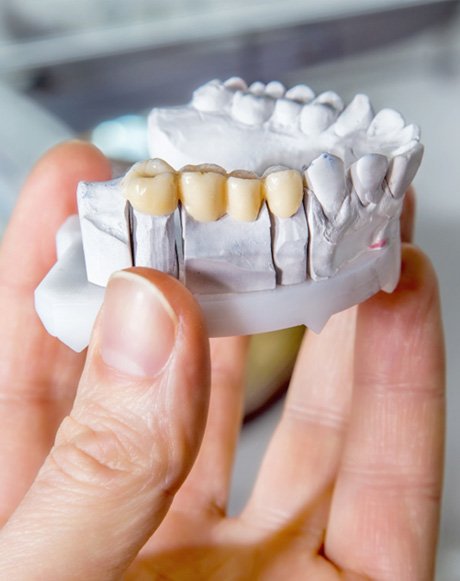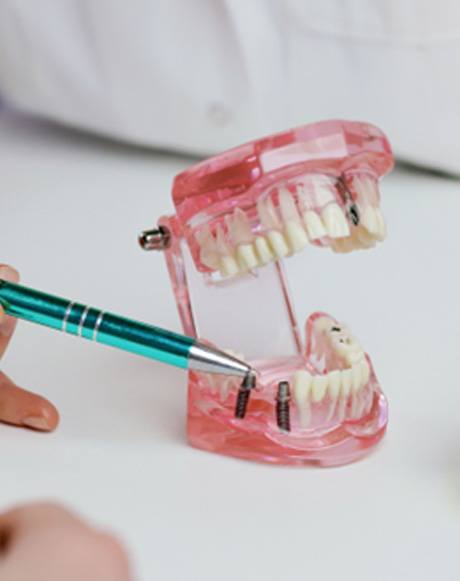Dental Bridges – Huntsville, OH
Providing Complete Smiles and Greater Confidence
Multiple missing teeth can be an embarrassing reality for many patients. Faced with various challenges such as eating and speaking, the gap left behind can serve as a reminder of what so many often take for granted – a complete smile. Dr. Kevin Grill and our team, though, want to give patients hope with the help of customized dental bridges in Huntsville. If you want to enjoy life with a full set of teeth again, call our office to schedule an appointment.
What is a Dental Bridge?

A dental bridge is considered a form of tooth replacement that has been used for decades. Capable of restoring and rebuilding smiles that contain gaps left behind by multiple missing teeth, these restorations offer greater bite force and chewing power while also improving and enhancing the function and aesthetics of patients’ smiles.
They are created using two dental crowns that are placed on the ends of the bridge and artificial teeth (pontics) that are used to bridge the two crowns. When placed over healthy abutment teeth and gum tissues, the result is a fully restored smile.
Types of Dental Bridges

Traditional dental bridges and implant bridges are the two different types of dental bridges you can expect Dr. Grill to discuss with you during your consultation.
Traditional Dental Bridge
With two dental crowns and artificial teeth making up a traditional dental bridge, this restoration is fixed into place using healthy abutment teeth. Delivering improved aesthetics, function, and confidence, dental bridges continue to be one of the go-to solutions for tooth loss.
Implant Bridge
A newer way to treat multiple missing teeth is with an implant bridge. Instead of altering healthy teeth to hold the restoration in place, an implant bridge uses titanium posts that are placed within the jawbone, fusing with the surrounding tissues over time. A custom bridge is then attached to the tops of the implants for longer-lasting function.
What Are the Benefits of Getting a Dental Bridge?

You may not realize it when you first decide to move forward with dental bridges, but the reality is that they offer many great benefits, including:
- The ability to feel confident when smiling, eating, and speaking
- The assurance of knowing that your new smile will remain in place for 10-15 years if you choose a traditional bridge or 30+ years if you opt for an implant bridge
- Can provide greater oral health because of the closure of the gap
- A natural appearance because of the materials used to create the bridge
Dental Bridges FAQs
Can I Take My Dental Bridge Out?
Your dental bridge contains a crown on either end that is cemented over either healthy abutment teeth or dental implants on both sides of the space in your smile. Many patients near Huntsville wonder whether these oral appliances are intended to be removed for cleanings, like dentures, or whether they’re a permanent part of your smile.
Technically, your new teeth aren’t necessarily ‘permanent’ because there’s a good chance they’ll eventually wear down and require replacement. However, dental bridges are not intended to be taken off once they’re attached, except by Dr. Grill or another qualified professional.
What Are Dental Bridges Made Of?
Historically, restorations like dental fillings, crowns, and bridges were made from amalgam metals that were much less discreet. Not only that, but these materials can conduct hot and cold temperatures into the roots of your teeth, causing sensitivity.
Today, our Northwest Family Dental of Huntsville team utilizes durable, tooth-colored materials to rebuild your smile’s appearance and functionality. Typically, these prosthetics are made from resilient ceramic, like porcelain, that reflects light like enamel and can be customized to be just the right size, shade, and shape for seamless results.
Does it Hurt to Get a Dental Bridge?
Although dental bridges can improve your appearance and abilities, like speaking clearly and thoroughly chewing food, some patients avoid them because they’re worried the process will be painful.
Fortunately, getting a dental bridge is usually a relatively straightforward process. First, our team will numb the area to help you feel calm and relaxed while we work. Then, if we’re anchoring your new teeth to healthy ones in your mouth, we’ll need to remove a small amount of enamel so they fit correctly. This can cause sensitivity for a few days, but taking ibuprofen or Tylenol is usually a safe way to address associated discomfort.
If you’re getting an implant bridge, then you can expect to experience mild to moderate aches for several days to a week or so following your procedure before they peak and begin to subside.
How Long Do Dental Bridges Usually Last?
These restorations usually last anywhere from 5 to 15 or more years, though it depends significantly on your individual circumstances. Some factors that can affect their longevity include:
- Your diet. Eating hard, crunchy, and sticky foods can damage your bridge or yank it out of place.
- Your oral hygiene. Your new teeth can’t get cavities but any remaining teeth and gums are at risk of common oral issues if you don’t brush and floss your teeth twice daily.
- Your habits. Biting fingernails, pen caps, smoking cigarettes, or drinking alcohol can all potentially harm your restoration.
- Where it’s located. Bridges over back teeth sustain more pressure from daily chewing, which can wear them down faster.
- How it’s anchored. Prosthetics held by abutment teeth might fail sooner if the underlying enamel is damaged or begins eroding.
Is a Partial Denture the Same as a Bridge?
No, partial dentures and dental bridges are not the same thing. Some people might refer to partials as “removable bridges,” but this is a misconception. Traditional dental bridges are created to remain in place for a decade or so and can only be removed by a dentist. On the other hand, partial dentures can be removed by a patient whenever they want. More importantly, partials can replace several missing teeth in various points along an arch, whereas dental bridges are designed to replace one to four missing teeth in a row. Partial dentures utilize metal clasps and clips that attach to your teeth to stay in place, while bridges are anchored via dental crowns on two abutment teeth on either side of the gap.
Can Dental Bridges Be Whitened?
While dental bridges look similar to your natural teeth, you cannot whiten them like the rest of your smile. Tooth enamel contains microscopic pores through which bleaching solution enters and breaks up stains. Restorations like dental bridges, however, won’t be able to do this, meaning it will remain the same color as it started. Keep in mind that your bridge can become discolored if exposed to dark-pigmented food and drinks too often, so you’ll want to minimize this to keep your smile healthy and fresh. If you do want to whiten your teeth, consult your dentist about brightening your natural teeth before receiving your dental bridge.
How Many Teeth Can a Dental Bridge Replace?
Based on what a patient needs, a dental bridge can replace one to four missing teeth in a row. That said, the majority of the time, these restorations are used to help replace only one to two teeth. The further a dental bridge extends, the less stability it will have, especially if the natural abutment teeth are not healthy or strong enough. Using this to replace three or more teeth in a row can make it risky in the long run. To reliably replace three or more consecutive teeth, implant bridges can be used instead, since the metal posts will be anchored to your jawbone for greater support.
Are Dental Bridges Safe?
So long as this restoration is placed by an experienced dentist, a dental bridge should be completely safe. Dental bridges do not contain traces of mercury like metal fillings, especially since they can be made out of tooth-colored materials, so you won’t have to worry about toxicity. Keep in mind that some patients might have allergic reactions to a certain metal alloy used in bridges, so make sure to discuss this with your dentist if you have experienced allergies or sensitivities to the metal. This can be a sure reason to recommend a metal-free bridge. If you notice any gum irritation, swelling, or redness near your restoration, notify our team for help, as these could be signs of an allergic reaction.
